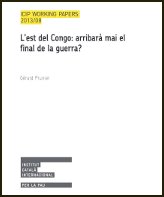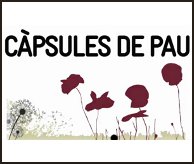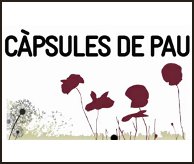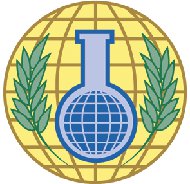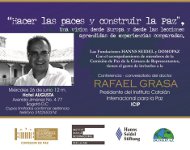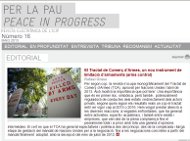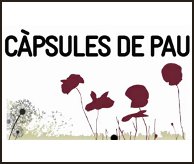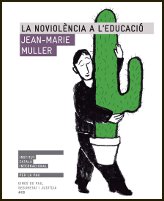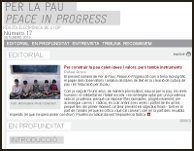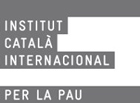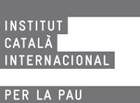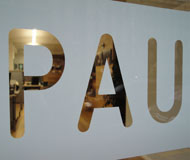Author: whads
What is Peace to Pere Ortega?
A new video of the project ‘Peace Capsules’ , coproduced by ICIP and Col·lectiu Contrast, has been published this week on the ICIP website. It is a short one minute long video entitled ‘What is Peace to Pere Ortega?’ and in which Ortega, researcher at Centre Delàs, considers what peace means to him. The video is accessible both on the ICIP website and on the ICIP Youtube Channel .
Until the 21st September 2014, International Day of Peace, ICIP will publish a new video capsule each week. Each capsule will count with the participation of an activist, actor or academic who will think of what peace means to him/her. The aim of the project is to compile different approximations to the concept ‘peace’ on the ICIP web site.
What is Peace to Pere Ortega?
A new video of the project ‘Peace Capsules’ , coproduced by ICIP and Col·lectiu Contrast, has been published this week on the ICIP website. It is a short one minute long video entitled ‘What is Peace to Pere Ortega?’ and in which Ortega, researcher at Centre Delàs, considers what peace means to him. The video is accessible both on the ICIP website and on the ICIP Youtube Channel .
Until the 21st September 2014, International Day of Peace, ICIP will publish a new video capsule each week. Each capsule will count with the participation of an activist, actor or academic who will think of what peace means to him/her. The aim of the project is to compile different approximations to the concept ‘peace’ on the ICIP web site.
ICIP Statement on the Nobel Peace Prize 2013
The Norwegian Committee has granted the Nobel Peace Prize 2013 to the Organization for the Prohibition of Chemical Weapons (OPCW) for “its extensive efforts to eliminate chemical weapons”, especially now that the Syrian chemical arsenal has proven the urgent need to end up with this kind of armament.
The International Catalan Institute for Peace (ICIP) considers this award to be “a well-deserved recognition for the important task performed by the OPCW over the last years, which has contributed to the elimination of 80% of the world’s chemical weapons”. Moreover, ICIP highlights positively the fact that the award recognizes the fight against disarmament, “one of the prominent figures presented by Alfred Nobel on the establishment of the Award”.
ICIP President, Rafael Grasa, believes that the Prize will be “an incentive for the countries which have not ratified the Chemical Weapons Convention to join it; Sudan, Angola, Egypt or Israel, to name a few”.
On the other hand, despite expressing a strong gratitude for the concession of the award to the OPCW, Rafael Grasa also considers that, again this year, the Nobel Peace Prize confirms a controversial tendency, a current tacticism, to recognize persons or institutions that have a relevant influence at the moment of the concession, such as demonstrates the task of the OPCW in Syria”.
Peace building work in Colombia
ICIP President, Rafael Grasa, travelled to Colombia last month of June to follow the evolution of the Peace process of the country and to explore new ways of collaboration with different universities and political and military institutions.
Grasa visited Bogotá, Cali and Medellin and met with representatives of the Commission of Peace of the Colombian Congress, members of local and regional governments, representatives of the Escuela Superior de Guerra (Superior School of War), of the Centro Nacional de Memoria (National Centre for Memory) and of the Direction of Attention to the Victims and Human Rights, among others. He also participated in a seminar on transitional justice mechanisms organized by the Universidad Javeriana; he read the conference ‘the disarmament, demobilization and reintegration programs of ex combatants in contexts of peace building’ at the Escuela de Guerra in Bogotá; and he also read the conference ‘Making and building peace. A vision from Europe and lessons from compared experiences’, in an event organized by the foundations Domopaz and Hanns Seidel, which also counted with the participation of members of the Commission of Peace of the Colombian Congress.
This trip fits within Focal Point 3 of the ICIP Strategic Plan, which sets as one of ICIP’s objectives the necessity of establishing and developing field missions in conflict zones or in areas under a peace consolidation or peacebuilding process.
What has the Arms Trade Treaty done for us?
What is Peace to Laurent Munyadilkirwa?
A new video of the project ‘Peace Capsules’ , coproduced by ICIP and Col·lectiu Contrast, has been published this week on the ICIP website. It is a short one minute long video entitled ‘What is Peace to Laurent Munyadilkirwa?’ and in which Munyadilkirwa, from the League for Promoting and Protecting Human Rights in Rwanda, considers what peace means to him. The video is accessible both on the ICIP website and on the ICIP Youtube Channel .
Until the 21st September 2014, International Day of Peace, ICIP will publish a new video capsule each week. Each capsule will count with the participation of an activist, actor or academic who will think of what peace means to him/her. The aim of the project is to compile different approximations to the concept ‘peace’ on the ICIP web site.
‘La noviolència a l’educació’, by Jean-Marie Muller
‘Education for peace today’
Changes in the ICIP Board of Governors
The Catalan Government (Generalitat de Catalunya) has appointed Miquel Puig Roig, General Director of Institutional and Parliament Relations, as one of the representatives of the ICIP Board of Governors , as stated by Law 14/2007 on the creation of ICIP. Miquel Puig will take over from Joan Auladell i Fontseca, former representative and member of the ICIP Board of Governors.
The ICIP Board of Governors is constituted by 11 members: 8 of them are appointed by the Parliament and the other 3 by the Government.
Changes in the ICIP Board of Governors
The Catalan Government (Generalitat de Catalunya) has appointed Miquel Puig Roig, General Director of Institutional and Parliament Relations, as one of the representatives of the ICIP Board of Governors , as stated by Law 14/2007 on the creation of ICIP. Miquel Puig will take over from Joan Auladell i Fontseca, former representative and member of the ICIP Board of Governors.
The ICIP Board of Governors is constituted by 11 members: 8 of them are appointed by the Parliament and the other 3 by the Government.
Catalan Parliament approves partial renewal of ICIP Board
On Wednesday, November 6, the Plenary Assembly of the Parliament of Catalonia approved the partial renewal of the ICIP Board of Governors, in compliance with Law 14/2007 regarding the creation of the Institute, and in accordance with Law 11/2011 regarding the restructuring of the public sector.
On the motion of the groups of CiU, ERC and the PSC, the plenary assembly approved the appointment of three new members, with 101 votes in favor, 3 against and 30 abstentions. The new members are Magda Oranich, lawyer; Alfons Banda, member of the Board of FundiPau (Foundation for Peace); and Antoni Pigrau, Professor of International Public Law at Rovira i Virgili University. In fact, Banda and Pigrau were reelected to a second term, since they were already members of the Board of Governors.
Thus Parliament elected three of the six candidates proposed by the Consell Català de Foment de la Pau (Catalan Council for the Promotion of Peace); the other three candidates were José Luis Gordillo, Cécile Barbeito and Neus Sotomayor.
The ICIP Board of Governors is now composed of seven members elected by Parliament (Alfons Banda, Àngels Mataró, Magda Oranich, Antoni Pigrau, Rafael Grasa, Mònica Sabata and Josep Maria Terricabras) and three members designated by the Government of the Generalitat (Miquel Puig, Carles Llorens and Eulàlia Pascual). Arcadi Oliveres and Vicenç Fisas are no longer members of the Board.
The renewal of the second part of the Board of Governors is scheduled to take place in 2014.

